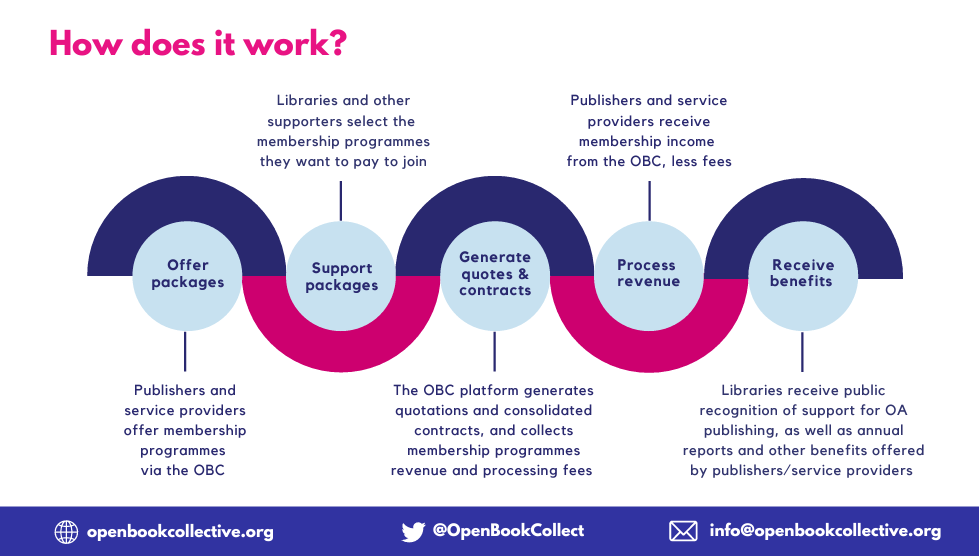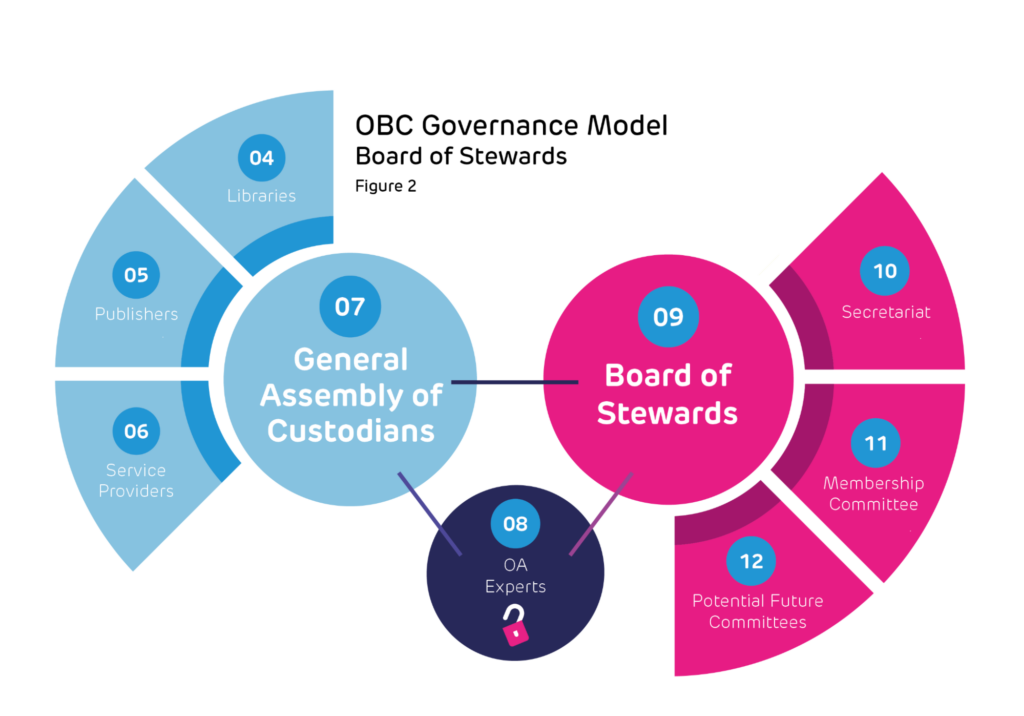
The Open Access (OA) publishing movement is at our doorstep. However, as an academic community, we are not yet ready to fully embrace and support the OA monograph transformation.
Books continue to lag behind journals in terms of OA publishing, infrastructure, and distribution.
The Open Book Collective (OBC) provides some key solutions for the existing challenges while charting a new collective path toward an open and sustainable monograph future.
The proliferation of OA policy mandates and library-funded OA pilots led by academic publishers or scholar-led presses combined with recent developments in infrastructural support for OA book publishing are important milestones in advancing the OA book movement. However, to successfully create a new path toward an open and sustainable monograph future, especially in humanities and social science, the global community of authors, publishers, infrastructure providers, and libraries must develop new OA publishing and funding models supported by open and sustainable infrastructures. We need an OA book publishing ecosystem that can counter the existing model, which is too often 1) inherently elitist and exclusionary when it comes to publishing, distribution, and readership, 2) reliant on commercially-owned, proprietary infrastructure, and 3) compromised by unsustainable publishing and funding models.
OBC’s collective path toward a sustainable OA monograph future
Built on the successes of the COPIM project (Community-Led Open Publication Infrastructures for Monographs) and established in May 2022, the Open Book Collective (OBC) is a collective of OA publishers, infrastructure providers, libraries, and other non-profit organizations. Established in the UK as a charitable Company Limited by Guarantee (CLG), it is a member-led, values-based organization with the mission to create a new OA book publishing ecosystem that is equitable, community-governed, and built on sustainable business models and community-owned infrastructures.
1) Community-owned OA business models and the OBC platform
At the heart of the OBC’s work is a community-owned online platform designed to support new relationships between libraries and OA book publishers, including academic, scholar-led, and not-for-profit publishers.
- For OA publishers and infrastructure providers, the OBC’s platform provides a venue to promote their OA programs and manage the funding they receive from supporting libraries and other knowledge providers.
- For libraries interested in supporting OA book initiatives, the platform provides a centralized discovery of various OA membership programs and related offers tied to publisher collectives, individual publishers, and publishing service or infrastructure providers. Through the platform, libraries can find, assess, bundle, and commit to financially support OA membership packages and initiatives offered by the collective.
By becoming members of the OBC, libraries enter into strategic co-ownership of new business models that positively influence how OA book production and dissemination will look in the future. The OBC empowers publishers, libraries, and infrastructure providers to collaborate on developing consortial funding models for OA books that are equitable for publishers and affordable for libraries. The OBC business model relies on relatively small annual contributions from a network of institutions, enabling a highly cost-effective funding method for OA book publishers and OA service providers. As a result, the libraries can easily redirect some of their existing funding spent on traditional book purchases toward supporting OA content, further developing and diversifying their existing collections. See Figure 1.

The OBC platform was launched in December 2022 and, since its inception, has received support from 25 universities worldwide and is currently under active consideration by several consortia. Around 90% of the OBC’s income goes directly to publishers and service provider members, with the rest covering the operating costs and contributing to the Collective Development Fund, intended to help individual OBC members sustain or expand their capabilities and operations. Still in the early stages of development, the fund’s primary goal is to support global bibliodiversity by enabling innovation for new OA book initiatives through small grants designed to support small non-profit publishers to be more sustainable and to better align with the technical and editorial standards of the larger open knowledge community.
2) Community-led governance model for OA monographs
The ethos of collaboration permeates the entire governance of the OBC. Research libraries supporting the OBC financially, together with publishers and infrastructure providers who participate in the collective, are committed to working together across the landscape of the open knowledge commons to enable a more sustainable future for OA monographs.
The OBC has adopted an “association” organizational model that is membership-shaped, community-led, democratically representative, equitable, and fully transparent. The existing structure empowers all members to directly participate in the OBC’s governance and related decision-making processes, unlike other organizational models where appointed Trustees are often not elected from the membership. The OBC Trustees serve as Stewards as they are partly selected from the members of the OBC and represent the main stakeholder groups called Caucuses. As a result, the OBC organization and its governance are made up of three bodies: 1) The General Assembly of Custodians (GAC), 2) The Board of Stewards (BoS), and 3) The Membership Committee (MC). See Figure 2.

The governance of the OBC has been designed to empower the growing community of OA authors, publishers, libraries, and research institutions, including OA experts who have deep knowledge of scholarly communications and open access, to support and lead non-commercial and non-proprietary OA publishing initiatives.
3) Partnerships with Open Book Futures to support the OA book ecosystem
The OBC is part of a larger holistic vision for the OA book ecosystem supported by Arcadia and the Research England Development (RED) Fund, who have together committed up to $7 million to continue the work of the pioneering COPIM project, including financial support for the OBC and the Open Book Futures (OBF) project. The OBC and OBF collaborate closely on amplifying bibliodiverse and equitable community-led approaches to OA book publishing. In addition to strengthening the existing networks in the UK and North America, these initiatives seek strategic partnerships with publishers, universities, and infrastructure providers in diverse national and linguistic contexts, particularly in Africa, Australasia, Continental and Eastern Europe, and Latin America.
The OBC and OBF will partner on expanding critical infrastructures for OA book publishing, including 1) the OBC’s platform enhancements, such as multilingual capabilities, dynamic currency conversion, and usability improvements; 2) an Info Hub containing practical and advocacy resources for libraries, publishers, and academics, including expert advice informed by the collaboration with the PALOMERA project on removing barriers for libraries to support OBC’s funding models, particularly in research funder policies and mandates; and 3) Toolkits for Smaller and Scholar-led Open Access Publishers, with pilot projects already in development that showcase experimental books and publishing workflows used by partnering presses.
In addition, the OBC and OBF deepen and further accelerate the outputs of the COPIM project, including:
- The Opening the Future revenue and business model, enabling non-OA presses to use library subscriptions to non-OA backlists to fund the publication of OA frontlist books. Currently in operation with Central European University Press and Liverpool University Press, the Opening the Future model is designed to be replicable by other presses with a Toolkit, open code, and template agreements with Jisc and Lyrasis. (See the earlier post on Opening the Future here on the OSC blog.)
- The Thoth open metadata management and dissemination platform, enabling presses to create rich metadata and providing a toolkit on how to export it in various formats as demanded by different platforms, libraries, and discovery channels.
- The Thoth Archiving Network, identifying and examining the critical challenges associated with archiving and preserving open-access monographs, particularly those published by independent, small, and scholar-led presses. The goal is to provide guidance to users of Thoth on how to easily upload their books to a distributed and trusted archiving facility hosted by member institutions for long-term preservation.
The landscape for OA monographs is still in flux and, thus, remains open for innovation. By pioneering new community-owned OA business models—including new funding and publishing models, as well as a new collaborative platform that is governed by and for the benefit of the community it serves—the Open Book Collective charts a new collective path toward an open and sustainable monograph future.
Presses, publishing initiatives, service providers, and libraries can apply to join the OBC based on the adherence to specific membership criteria.
Lidia Uziel is Associate University Librarian for Research Resources and Scholarly Communication at the University of California, Santa Barbara, where she holds the overall strategy, management, and planning responsibilities for the UCSB Library’s general and special collections, scholarly communication program and technical services operations. Her current research is in digital knowledge management, including the intersection of scholarly communication, libraries, and digital humanities/computational projects. She is the Chair of the Board of Stewards of the Open Book Collective and was actively involved in the COPIM (Community-Led Open Publication Infrastructures for Monographs) project.
Tags: Books, Open Access, UCSB



